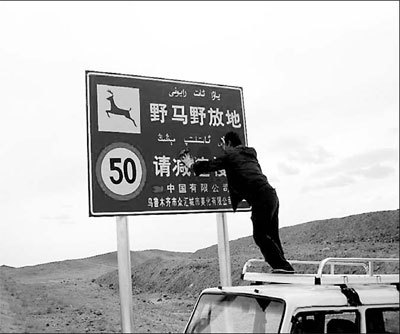It was Przewalski's horses that inspired global diversified technology company 3M to take part in a nature conservation protection project in Xinjiang.
Przewalski's horses, with their short bodies and reddish-brown coats, are the only surviving subspecies of horse that have never been domesticated. There are less than 200 in the world, with a group of them inhabiting the Karamoni nature conservation area in northwest China's Xinjiang Uygur autonomous region.
Sparse rainfall last year forced a group of Przewalski's horses to seek water in a nearby field across a highway. Sadly, between August 15 and September 8 last year, four Przewalski's horses died in traffic accidents on the highway, drawing the attention of the public as well as world-leading traffic management production and solutions provider 3M.
Wildlife project
Staff at the company's Xinjiang office were astonished by the news and wanted to do something to improve highway conditions to prevent traffic accident and protect Przewalski's horses, according to Tom Li of the Xinjiang office, who is also one of the volunteers participating in the wildlife protection project.

A worker washes a sign warning of Przewalski's horses along a highway in Xinjiang's Karamoni nature corvation area.
"We live with a strong relationship with the natural environment and wildlife. Though we are not able to control nature, we still have the responsibility to build a safe environment for wild animals and to better manage human behavior," Li says.
The office reported to 3M China's head office, and the company soon took action to support the Xinjiang office.
Based on its traffic management expertise, 3M now supplies a series of special solutions for the Karamoni nature conservation. Most of them focus on improving the visibility of warning signs under bad driving conditions.
Furthermore, the company donated intense reflective film to enhance road signs' brightness, aiming to better warn drivers to reduce driving speeds when crossing the wildlife conservation.
"Thanks to the measures, drivers can find more striking warning signs on the highway and along the road when entering the wildlife protection areas," says Dexter Yang, senior manager of 3M China's public affairs department.
"3M has its own way of doing business and choosing corporate social responsibility (CSR) projects," says Yang, adding that the company uses corporate technology and expertise to carry out social causes.
According to Yang, 3M has been the leading provider of traffic management products and solutions since 1993. Since then, it has conducted a string of social activities to help improve traffic security, donating hi-tech reflective film for road signs and sponsoring various educational programs to enhance public awareness.
Environmental protection
As the first wholly owned foreign company in Shanghai, 3M has sought long-term development in China since 1984. Environmental protection has been at the core of the multinational's CSR strategy.
"After 24 years of growth, 3M is proud of its long-term commitment and contribution to sustainable development by investing in environmental protection programs, social responsibility and economic progress," Yang says.
Given the Chinese government's focus on energy savings and emissions cuts and ever-increasing global calls for green development, many multinational companies make environmental protection the center of their CSR strategies.
Nokia and Motorola have joined hands with China Mobile to initiate a mobile phone recycling program. Coca-Cola and Pepsico take part in the Mother of Water project - a program engaged in helping water-shortage areas and poverty-stricken mothers to get clean water. And Sun and HP fund research and development for energy saving products and solutions.
To increase efficiency of environmental protection projects, 3M seeks to co-operate with experienced organizations.
Three years ago, 3M donated US$3 million to the Conservation International Center (CI), a non-governmental organization engaged in protecting natural resources, in order to strengthen virgin forest protection in southwestern China.
The project has already helped establish several virgin forests as demonstration bases in Yunnan and Sichuan provinces.
Last year, 3M cooperated with CI to sponsor a non-carbon emission musicale in Beijing's Zhongshan Park, which neighbors Tian'anmen Square. Through the musicale, 3M organized an educational program to help audiences obtain more information about global climate change and inspire them to take action to protect the environment.
3M donated hi-tech heat insulative film to the theater. According to the investigation, the film helps reduce the usage of air-conditioners and decrease CO2 emissions by 7.8 tons only on that musicale day.
3M China added another $1 million to CI last October to promote fresh water resource protection of the Yangtze River and is planning to support further research on riverhead protection.
Early in March, 3M China won the "Best Performance Award on Translating Global Climate Change in 2007" at the United Nations Climate Change Conference for its activity at Zhongshan Park.
(China Daily March 31, 2008)